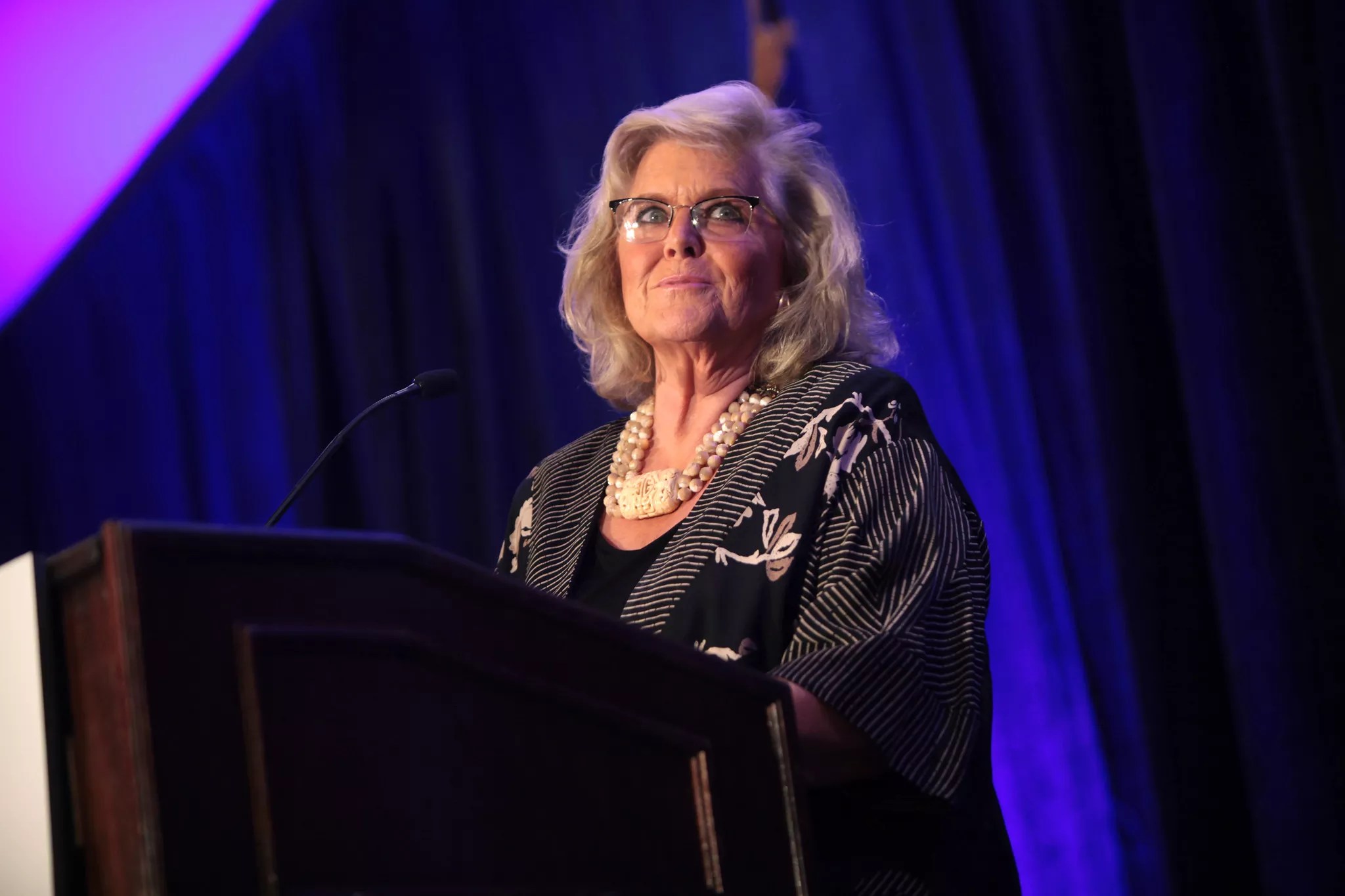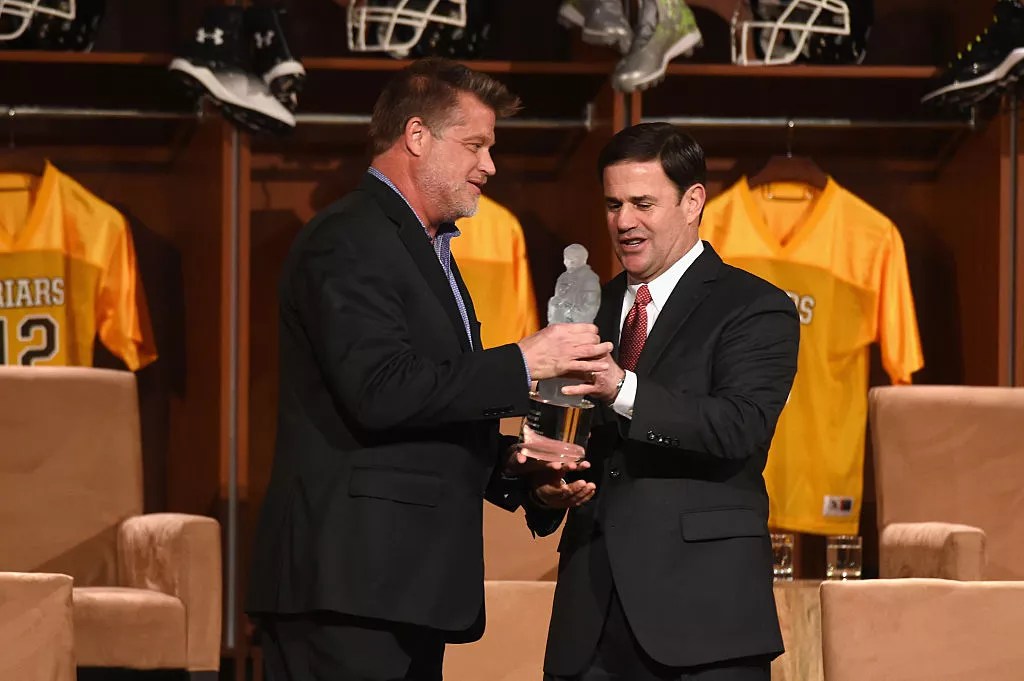
Screenshot via YouTube

Audio By Carbonatix
The Goldwater Institute, Arizona’s premiere conservative think tank, claims it cares about nothing more than protecting your tax dollars. The organization is a friend of “taxpayer rights,” says its website. The taxes you pay – which it argues should be few – should go where they’re supposed to.
To prove its argument, Goldwater is suing to end Arizona’s Motion Picture Production Program, which is overseen by the Arizona Commerce Authority. Passed by the Arizona Legislature in 2022, the program is meant to spur film production in the Grand Canyon State by offering up to $125 million in tax credits to qualified projects.
That’s corporate welfare, Goldwater argues. The program provides “valuable advantages” to private interests, “depletes the public treasury” and “distorts the market.” In a lawsuit filed in Maricopa County Superior Court, Goldwater argues that the program violates the Arizona Constitution’s gift clause, which says the state cannot “give or loan its credit in the aid of, or make any donation or grant, by subsidy or otherwise, to any individual, association, or corporation.”
Never mind, of course, the tax credits that favor the interests of members of the institute’s very conservative board of directors. Including tax credits for film production.
Goldwater may want to eliminate Arizona’s film production credit, but films produced by Goldwater’s board chairman, Eric Crown, apparently tapped the very same benefits in another state. On LinkedIn, Crown lists himself as the “Executive Producer of the Teenage Mutant Ninja Turtles movies,” which were partially filmed in New York. Per IMDB.com, Crown earned producer credits on the 2014 live-action reboot of the franchise and its 2016 sequel, “Teenage Mutant Ninja Turtles: Out of the Shadows.”
Both films acknowledge the support of the New York State Governor’s Office for Motion Picture and Television Development. Phoenix New Times could not verify that the 2014 film received a tax credit, but a September 2016 report from New York’s Empire State Development office noted that the sequel received a credit of $19.2 million. That’s around 30% of the film’s total of $63 million in “qualified costs.” The production’s total budget reportedly was $135 million.
Crown told New Times he wasn’t sure what tax credits the films received but insisted he opposes state film tax credits in general.
“I just have been a believer that the government should just make a level playing field,” said Crown, the co-founder of the Tempe-based technology company Insight Enterprises. “Don’t pick winners and losers.”
Crown said he has consistently opposed film tax credits like Arizona’s, in part because “business needs to have a little pressure of profit, loss and everything else.” It strikes him as “corporate cronyism” when he sees “the government handing out free checks.” He also said state film tax credits don’t work.
The jury’s out on that. Opponents of tax credits point to studies such as a 2016 paper from the University of Southern California’s Price School of Public Policy. In it, researchers found that such tax incentives did not lead to sustained job creation or wage growth, nor did they lure film production away from the moviemaking hubs of New York and California.
But supporters of Arizona’s film tax credit financed a study that said Arizona would benefit from building big studios planned for the East and West Valley, claiming the credits would realize a fiscal gain for the state by year seven of the program. The study also claimed the film tax credit was “no less constitutional” than the ACA’s other tax incentives and grants to such industries as steel producers and computer chip manufacturers.
Via text, Crown later admitted that New York state tax credits may have been good for his movies, but he didn’t know if they were good for the taxpayers. “Government shouldn’t be subsidizing big business or movie studios,” he wrote.
Whether the movies were good is another matter. Crown’s first TMNT film has a 21% fresh rating on Rotten Tomatoes, while the sequel has a 38% rating.

Randy Kendrick is a Goldwater Institute board member and wife of Arizona Diamondbacks owner Ken Kendrick.
Gage Skidmore/Flickr/CC BY-SA 2.0
Movies bad, baseball good
Another Goldwater board member may soon benefit from a sweet tax giveaway. Conservative activist and attorney Randy Kendrick is the wife of Arizona Diamondbacks owner Ken Kendrick, who wants tax money to pay for improvements to Chase Field, which is owned by Maricopa County.
For years, the county and the Diamondbacks have feuded over who should pay to update the nearly 30-year-old stadium. If a solution isn’t found – specifically, one that includes a chunk of public money – Ken Kendrick has suggested the Diamondbacks could relocate to another state when the Chase Field lease expires in 2027.
To avoid that, the Diamondbacks are backing legislation sponsored by state Rep. Jeff Weninger. The Chandler Republican’s bill would divert both state sales taxes earned at Chase Field and the state income taxes of Diamondbacks employees – including the players – into a county fund to pay for renovations and major repairs to plumbing, the ballpark’s retractable roof and the air conditioning system. The Diamondbacks have vowed to contribute $250 million to the fund.
But the diversion, which has been approved by the state House and awaits action in the Senate, will be costly to both state and local tax coffers. A fiscal note by the Arizona Joint Legislative Budget Committee estimates that the “combined state and local revenue loss” will be $15 million per year. Phoenix Mayor Kate Gallego called the plan a “major league boondoggle” in a recent letter to Gov. Katie Hobbs, claiming it could cost taxpayers more than $1 billion over the next 30 years.
The Goldwater Institute has not opposed or supported the legislation. Asked whether she found that neutrality inconsistent with Goldwater’s stance on the film tax credit, Randy Kendrick drew a distinction between the two scenarios. The Diamondbacks do not own the stadium, but instead lease it, she noted in a text. She said the relationship was the same as between landlord and tenant.
“In typical common law, the landlord repairs and maintains the buildings they own,” Kendrick wrote. “This facility is approaching 30 years old and needs some significant infrastructure repairs and maintenance. This legislation is strictly to keep the facility operating in a safe manner for the public. This recaptures certain taxes generated and dedicates them for upkeep of the building.”
Notably, a 2018 deal with the county granted the Diamondbacks control of booking Chase Field for concerts and other events – and the ability to keep the revenue those events generated. In return, the team assumed responsibility for the stadium’s upkeep.
Regardless, the film tax credit is another animal, Kendrick said.
“The tax credit in the film industry program goes to private corporations and individuals. That’s an entirely different proposition!” she wrote. “I hope I’ve made clear what I think the difference is.”
Still, there’s ample debate about whether public financing for pro sports stadiums is good tax stewardship. During a Feb. 4 hearing about the bill at the legislature, representatives of two ideologically opposed nonprofits spoke against the legislation.
Margaret Schultz of the left-leaning advocacy group Worker Power argued that independent research showed a “limited” positive impact of “sports stadium subsidies,” which are “unpopular with taxpayers.” Kevin McCarthy – the president of the conservative Arizona Tax Research Association, who also spoke against the 2022 film tax credit bill – said local governments would “rather keep their taxes” to pay for public services and infrastructure improvements. The Chase Field bill would rejuvenate a “bad policy” tool that “should be put to rest,” he added.
Parker Jackson, a staff attorney with the Goldwater Institute who helped bring the film tax credit suit, told New Times that he was unaware of Goldwater ever taking a stand on the Chase Field situation. Nevertheless, he said the stadium carve-out was different because the county has an ownership interest in the ballpark.
“As far as the propriety of what’s being done currently or what was done when the stadium was built 20 or 30 years ago,” he said, “I don’t have a specific comment on that.”

Eric Crown (left) and former Gov. Doug Ducey (right) both serve on the board of the conservative Goldwater Institution.
Michael Buckner/Getty Images
Loosey Ducey
Ex-Gov. Doug Ducey is another member of Goldwater’s board, a fact both unsurprising and, in light of the film tax credit suit, ironic.
Though a conservative, Ducey was hardly averse to handing out tax incentives. During his governorship, he co-chaired the Arizona Commerce Authority, which doles out grants and incentives to corporations like Halloween candy. As he left office in 2022, he also proudly announced the ACA had obtained $100 million in federal funds for the benefit of Arizona’s semiconductor industry.
Goldwater is suing the ACA over the film tax credit.
Ducey could have saved Goldwater – and the state of Arizona – the cost of this litigation by vetoing the credit when it came to his desk during his final year in office. Instead, Ducey allowed the very incentives that Goldwater has characterized online as “lavish Hollywood handouts” to become law without his signature.
Asked if he saw a conflict between Ducey’s action on the law and the ex-governor’s presence on the board, Jackson said he didn’t think so because Ducey didn’t sign it. But Ducey could have vetoed it, right?
“Sure, he could have,” Jackson said. “There’s all sorts of stuff that happens with legislation and budget negotiations and stuff behind the scenes. I don’t have any direct knowledge of that, and it doesn’t affect the lawsuit directly.”
The ACA itself is a controversial institution among conservatives and was the subject of vigorous debate last year, when it was scheduled to sunset. Some legislators argued that the agency should be eliminated, and Arizona Attorney General Kris Mayes issued an opinion stating that multi-million-dollar CEO junkets sponsored by the ACA clearly violated the gift clause. Ultimately, the legislature reauthorized the ACA through 2029.
Jackson said that only the ACA tax credits “that violate the gift clause are bad.” He added that the Arizona Supreme Court ruled that “indirect” benefits, such as those touted by supporters of Arizona’s film tax credit, don’t pass muster. Even if the rosiest of projections are true and the film tax credit eventually makes money for the state, the credit would still be inappropriate.
As the former co-chair of the ACA, Ducey’s spot on Goldwater’s board might seem an odd fit. It’s not: Ducey was largely responsible for the institute’s two big ideological wins in recent memory. One was signing into law the Goldwater-backed expansion of private school vouchers, known as Empowerment Scholarship Accounts. The other was instituting a 2.5% flat income tax, which took effect at the beginning of 2023.
According to the nonpartisan Grand Canyon Institute, both initiatives are reverse Robin Hood budget-busters. The think tank pegged the flat tax’s annual cost at $2 billion in lost revenue, claiming that 70% of the flat tax’s benefits “went to households with incomes above $200,000.”
ESAs have been a similar giveaway to the wealthy, with an estimated net cost of $429 million for the current fiscal year. The institute also reported that parents often bank the ESAs, resulting in “$360 million in funds, including those carried over from prior fiscal years, that have gone unspent.” ProPublica reported that the average ESA award of roughly $7,000 mostly went to middle- and upper-income families who were already sending their kids to private schools.
Despite that, the Goldwater Institute has crowed about both the flat tax and the ESA expansion. On its website, Goldwater said it was “proud to have simplified the state’s tax laws and reduced the burden on Arizona’s taxpayers” with the flat tax. As for the ESAs, Goldwater claimed they’re “free” programs that give “every parent in Arizona the power to get their child into a school that fits.”
Jackson said “every state constitution” requires funding education while “there’s no part of the constitution that says the state is supposed to fund movies.” That’s true, though the constitution does not mandate that the state pay wealthy families to send their children to private academies.
Dave Wells, the research director for the Grand Canyon Institute, said ESAs are about “privatizing things that government has done,” and the flat tax is about “reducing the scope of what government is even able to do.” Goldwater likes to proffer “silly arguments that these things will pay for themselves or lead to massive dynamic economic growth.”
“If any of that was true, Arizona would probably be the richest state in the country,” he added, “because we’ve been doing massive tax cuts since the ’90s and are still not at the medium level of income in the country.”
A persuasive anti-tax-break argument, perhaps one Goldwater might consider using in court – unless someone needs it finance a movie about ass-kicking turtles.